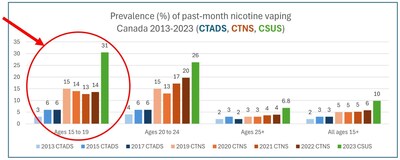OTTAWA, ON and MONTREAL, Feb. 12, 2025 /CNW/ – Last December 27th, between Christmas and the New Year, with no news release nor public statement by Addiction Minister Ya’ara Saks, Health Canada published the results of the first edition of the Canadian Substance Use Survey, a robust new survey of 36,180 respondents including 7,026 youth and young adults aged 15-24.
According to the data, a third (31%) of Canadian teenagers (aged 15-19 years) used a vaping product in the last 30 days. Previous surveys (with different methodologies) estimated this rate at 13 to 15 % over the previous four years.
“These are extraordinary numbers that surpass all previous estimates from other surveys that measured youth vaping. The new data clearly merits the urgent and undivided attention of our politicians as well as immediate action on long-awaited measures to curb youth addiction to nicotine,” says Cynthia Callard, Executive Director of Physicians for a Smoke-Free Canada.
“After months of dithering and delays with respect to the finalization of three-and-a-half-year-old proposed regulations to restrict flavours, we believe these numbers should compel Minister Ya’ara Saks to quickly finalize the regulations to prohibit the sale of flavoured vaping products that drive youth experimentation and their consequent addiction,” explains Flory Doucas, Spokesperson and Codirector of the Quebec Coalition for Tobacco Control.
“To do otherwise is to allow the industry and government to profit from the vulnerability of young people to the sugar-coating of an addictive drug.” It was recently revealed that the federal government collects $75 million a year in vaping taxes from high-school students.
Time is running out to finalize draft flavour regulation
Despite multiple reassurances that they are on the verge of being finalized, the draft regulations remain in limbo. The announcements of new delays often coincide with meetings between Minister Saks and the pro-vaping lobby.
“When Minister Saks echoes industry arguments about the illicit market to justify delaying the regulations’ finalization, she ignores the fact that the bulk of the current cases of non-compliance rests on legal vaping businesses, like those who are circumventing the Quebec ban by falsely mislabeling of fruit and mint products as “tobacco” flavouring, by delivering non-compliant products to Quebec from other provinces through on-line sales, and by selling flavoured liquids that can easily by mixed to e–liquids,” added Ms. Doucas.
This article was originally published by a finance.yahoo.com . Read the Original article here. .

